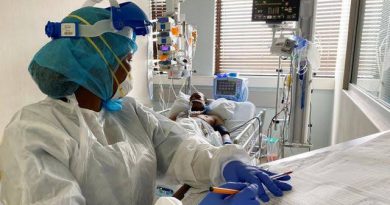Gaza cancer patients miss treatment as Israel border shut amid fighting
Gaza (Reuters) – Gaza resident Dina El-Dhani was due to meet her oncologist this week at a hospital in Jerusalem but she has been unable to cross into Israel since the border was closed amid heavy fighting between Israel and Palestinian militants.
Dhani is one of 432 cancer patients who have not been able to receive treatment since Tuesday, when Israel launched attacks on the Islamic Jihad militant group, setting off a surge in cross-border violence.
Her appointment with a doctor at Augusta Victoria Hospital in Jerusalem was meant to determine which radiation treatment she will receive.
“They told me it is delayed. Do I have to wait another two months to get a new appointment?” said 40-year-old Dhani. “The crossing is life, because as patients our treatment doesn’t exist here. (The border crossing) either enhances my treatment or enhances my departure.”
The four days of fighting with intense Palestinian rocket fire and Israeli air strikes has disrupted the lives of millions of people.
Israel and Egypt, citing security concerns, maintain a blockade on Gaza, which is ruled by the Islamist group Hamas.
The crossings this week have been under the constant threat of Palestinian rocket fire and remained shut, said a spokesperson for Israel’s military-run liaison with the Palestinians.
Due to shortages of medical equipment and medicine, Gaza’s hospitals are unable to provide proper care for cancer patients. So most travel to Israel, the occupied West Bank, or other countries for treatment. Palestinian health officials blame the 16-year-old blockade for undermining the development of the health sector.
“Unfortunately, we live in between two crossings and are besieged from both directions (Israel and Egypt),” said Aya Kolab, 30, who was due for a genetic test at a hospital near Tel Aviv to help her treatment.
“All my dreams stopped because the war stopped me from going, as Erez crossing is closed,” she wrote on social media, referring to the main passage to Israel.
Gaza Health Ministry spokespersona Ashraf Al-Qidra said the border closure has prevented 432 cancer patients from visiting hospitals in Israel, East Jerusalem, and the West Bank, 27 who are listed as “life-saving” referrals.



